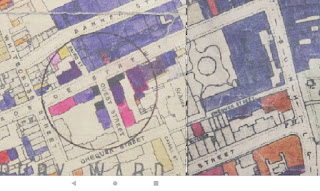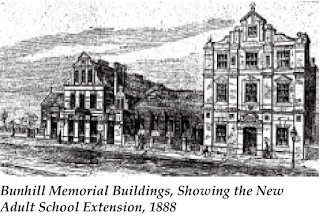|
Last Sunday, the weather in London was beautiful—perfect conditions for holding meeting for worship in the courtyard outside Bunhill Fields Friends' meetinghouse.
About halfway through meeting, the sun began to feel very warm on my back, and I moved to a place near the boundary wall of the property. It's the same wall that supports George Fox's burial marker and holds the Memorial Buildings tablet shown in the photo to the right.
It's likely that all of us were troubled in our spirits by the horrors (a weak word!) of the previous day's missile attacks and armed incursions on Israeli cities, towns, settlements, and kibbutzes, and a desert music festival, on the part of Hamas fighters based in the Gaza Strip. The majority of the victims of Hamas's murderous brutality were civilians, including children, making these actions a war crime. Another war crime: taking innocent hostages.
Aside from Israeli responses within Israel, air strikes against targets in the Gaza Strip began the same day and continued overnight and into Sunday.
That morning, as I sat in the shadow of the wall, I listened intently. Somewhere underneath the bird calls, the traffic sounds, and the children playing in the nearby playground, I seemed to hear distant echoes of bombs and missiles.
The London borough of Islington suffered several Nazi bomb attacks during the Blitz, and one of those attacks destroyed the Memorial Buildings housing Friends outreach missions and the large meetinghouse, located a few feet away from where we were now sitting, leaving only the narrow brick building that still serves the meeting.
The death and destruction of the Blitz bombs on Islington happened eight decades ago, but in that moment they seemed very fresh and vivid, and merged in my mind with the war being raged that very hour in Israel and the densely populated Gaza Strip.
The question came to me as we sat in peace and safety, removed by time and space from any bombs, any missiles, anyone aiming guns at innocent civilians: what do we do with our safety?
Here are a few things I don't want to do.
- First, as a supporter of Palestinian rights and an opponent of apartheid in all of the territories occupied and controlled by Israel, I don't want to minimize the cruelty of the Hamas attack in any way whatever. No matter what the individual Hamas killers thought they were fighting and dying for, they were mobilized by leaders who apparently intended to inflict pure evil on civilian populations.
- On the other hand, I don't want to join the unseemly political competition to be the most outraged by the Hamas attack. In the heat of this competition, some have illogically and cynically blamed the attack on the U.S. president, or used it to argue against humanitarian and development aid to Palestine, or proposed banning the Palestinian flag. None of this helps Israel or anyone else.
- I don't want to forget, in the heat of crisis, that everyone on all sides of this awful conflict is created in the image and likeness of God, but all of them (us) may all be very tempted to forget this reality—about themselves and about their so-called enemies. The principalities and powers that sanctify violence rely on our willingness to let them define who is an enemy, who must be eliminated or put behind barbed wire or denied food, water, medicine, or elemental respect. In Jesus' name, I want to say "no" to those systems, and encourage you to do so, too.
I find it fascinating that Israel's near-microscopic surveillance of Palestinians, including the Gaza Strip, did not pick up advance warnings of last Saturday's attack. This tells me that the vast majority of Gazans were as surprised by the attack as Israel was. This attack was not backed by popular pressure, despite the miseries of living in an apparently permanent Israeli chokehold. If there had been a widespread conspiracy to mount this attack, I'm certain that Israel's sources would have found out.
I also find it bitterly ironic that neither Israel and its allies, nor Hamas, seem to have "learned the lessons" of the previous round of lethal conflict. Hamas found a way to escalate, despite the promises of Israeli leaders in 2021 to teach them a decisive lesson. And once again, Israel follows the Hamas script by raining destruction on Gaza City, exactly what Hamas seems to need to retain their hero status.
With Gaza already under the threat of a total siege and blockade, how does Israel escalate this time except by imposing measures guaranteed to cause more innocents to suffer and die—innocents whom Israel is bound by international law to protect? In my fantasies, Israeli and Palestinian law enforcement, with international assistance, would cooperate to find the Hamas leaders responsible for this bloodshed, even as they seek to respond to legitimate Palestinian grievances. That's a lesson that nobody seems to want to learn, despite all the bloody evidence that bombs and missiles and massacres of civilians do not bring a sustainable peace.
Timothy Snyder on terror and counter-terror.
For the victim, terror is about what it is. For the terrorist, it is about what happens next.
. . .
When you have been terrorized, the argument that I am making seems absurd; the terrorists can seem to you to be raving beasts who just need punishment. Yet however horrible the crime, it usually does not bespeak a lack of planning. Usually part of the plan is to enrage.
Lesson: "I will never lose my optimism. There are people on both sides who want peace. The real battle is not between Israel and Palestine, but between those who want to coexist and those who dream of expelling or killing the other side." — Palestinian educator Khalil Bashir, in Yousef Bashir's The Words of My Father: Love and Pain in Palestine.
The "nones" (nonbelievers or people not associated with any form of organized religion) are not just a European or American phenomenon. The Associated Press Religion Team reports on "nones" in several parts of the world.
What do Charismatics and Quakers have in common? I've covered some of this topic over the years (here's a wordy example from 2007) but I highly recommend this compact and thoughtful article by Andy Stanton-Henry.
From the Martin Mary Center's Sightings: The "salesman" as American icon ... and the cost of relentless positivity.
The CBC ends a tradition that I remember well from my years in Ottawa: the daily time check.
Magic Slim and the Teardrops in Italy.



No comments:
Post a Comment